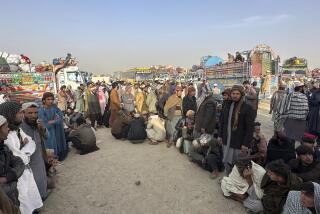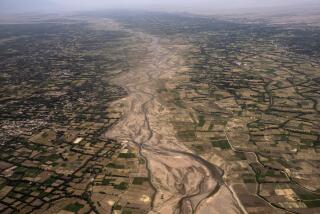Two U.S. troops killed amid Afghan protests over Koran burning
On a day when President Obama personally apologized for the burning of Korans at an American-run military base, violence over the incident escalated ominously with the killing of two American troops by an Afghan army soldier during a demonstration in eastern Afghanistan.
At least 13 people have been reported killed in unrest that broke out after Afghan laborers at the Bagram air base discovered late Monday that discarded Korans were being disposed of in the incinerator used to burn trash.
The fury appeared unabated despite the apology from Obama, reported Thursday by Afghan President Hamid Karzai’s office. The presidential palace said a letter received from the U.S. president conveyed deep regret and offered assurances that “the error was inadvertent” and that those responsible would be held accountable.
Anti-foreigner sentiment is never far below the surface in Afghanistan, and in this deeply religiously conservative society, the episode triggered some of the most concerted expressions of outrage in years against the decadelong U.S. and Western presence. Foreign missions, including the U.S. Embassy, put sharp restrictions on the movement of personnel, and most international aid and development firms put their foreign staffs on lockdown.
The shooting deaths of the two American troops took place at a base in the Khogyani district of Nangarhar province, said district Gov. Mohammad Hassan. He said hundreds of protesters had gathered outside the base and were chanting anti-American slogans when the attack took place. The assailant then escaped into the crowd, he said.
In April, two American soldiers were shot and killed by a policeman in northern Afghanistan during a day marked by protests over an American pastor’s intentional burning of the Koran. Days earlier, seven foreign U.N. workers were killed in the northern city of Mazar-i-Sharif in riots that resulted from the Florida evangelical church leader’s action. At least nine Afghan civilians were also killed during protests in the southern city of Kandahar, the spiritual home of the Taliban movement.
Previous Koran abuse incidents in the Guantanamo Bay prison and Iraq also led to wide-scale violence in Muslim nations. Then-President George W. Bush and senior military commanders issued apologies after an American soldier in Iraq used a Koran for target practice in 2008.
On Thursday, North Atlantic Treaty Organization officials confirmed that a man in an Afghan army uniform had killed two of its service members in eastern Afghanistan. Even before the current outbreak of unrest, turncoat shootings such as the one in Nangarhar province have systematically eroded trust between Western and Afghan forces, with dozens of similar attacks taking place over the last two years.
The Taliban movement, which had already denounced the burning of Korans as a “barbarous” act, issued harsh new threats against Western troops. In a wide-ranging statement, the group denounced “numerous crimes and horrors” in the decade since a U.S.-led invasion toppled the Taliban, and said members of the Afghan police and army should take advantage of their position to kill their ostensible allies whenever the opportunity arose.
“Those who kill an infidel shall not be put into hellfire with him,” the statement said. “The killing of a warring infidel earns one a place in paradise.”
Thursday marked the third straight day that Afghans took to the streets to express outrage over the burning of discarded copies of the Muslim holy book at the sprawling U.S.-run military installation north of Kabul, the capital. Afghan laborers Monday found bags of Korans among the trash bound for the giant incinerator and were able to prevent some copies from being burned, while displaying the remains of others to people living near the base.
A joint U.S.-Afghan investigation into the incident is underway and Western troops across Afghanistan are undergoing training on the proper handling of religious materials.
Special correspondent Aimal Yaqubi contributed to this report.
More to Read
Start your day right
Sign up for Essential California for news, features and recommendations from the L.A. Times and beyond in your inbox six days a week.
You may occasionally receive promotional content from the Los Angeles Times.






